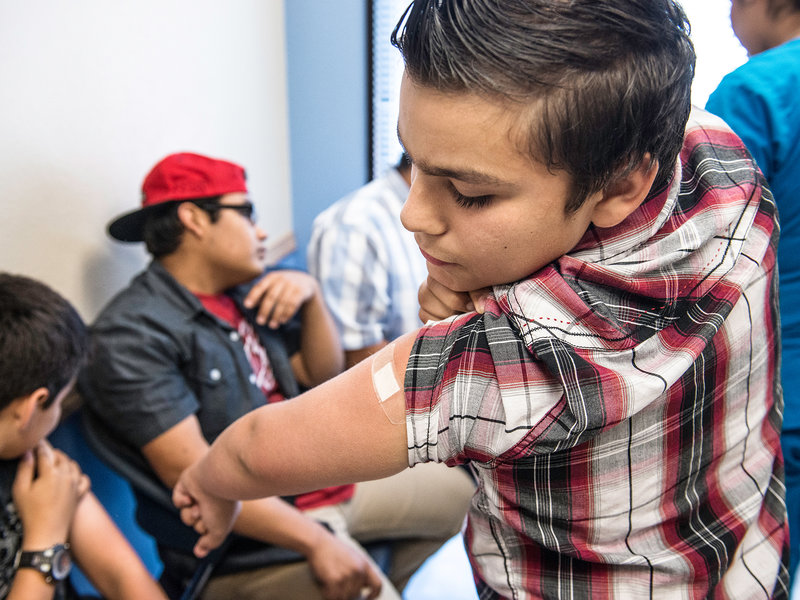- Study Says Most Parents Don’t Use Car Seats In Ride Share Vehicles Like Uber
- This 12-Year-Old Boy Is A Sophomore Aerospace Engineering Major!
- Fire Safety Experts Warn Of Hand Sanitizer Danger After A Mom and Kids Escape House Fire
- Recall Alert: Peaches May Be The Cause Of Salmonella Outbreak, 68 People Ill
- Summer Vacation In The Days Of COVID: Tips To Stay Safe
- How To Safely Grocery Shop During The Coronavirus Pandemic
- Michigan Teen With Vape-Related Illness Undergoes Double Lung Transplant
- Teen Kicks Off Anti-Vaping Campaign From Hospital Bed
- Teenager Receives Life Sentence For Strangling Sister To Death Over A Wi-Fi Password
- Toddler Falls To Death From 11th Deck of Cruise Ship
This Vaccine Can Prevent Cancer, Yet Many Teens Still Don’t Get It


Every year, roughly 31,000 men and women in the U.S. are diagnosed with a cancer caused by an infection from the human papillomavirus, or HPV.
It’s the most common sexually transmitted virus and infection in the country.
In women, HPV infection may lead to cervical cancer, which leads to about 4,000 deaths per year.
In men, it can cause penile cancer.
HPV also can also cause some cases of oral cancer, cancer of the anus and genital warts.
The CDC says that HPV vaccination can prevent many of these cancers, and urges pediatricians to recommend HPV vaccination for all their patients, beginning at age 11.
Now, a new analysis from the Blue Cross Blue Shield Association finds that only 29 percent of the teens its members insure receive a first dose of the HPV vaccine by their 13th birthday.
The CDC also finds that nationally, only 43 percent of teens are up-to-date on all the recommended doses of the vaccine.
“It’s important for 12 and 13-year-olds to get the HPV vaccine to provide immunity so that when they may be exposed to HPV later in life, typically through sexual activity, they have protection, says Dr. Margaret Stager, of the Metro Health Medical Center in Cleveland.
She’s a pediatrician and spokesperson for the American Academy of Pediatrics.
The CDC summarizes the transmission of the virus bluntly: “People get HPV from another person during intimate sexual contact. Most of the time, people get HPV from having vaginal or anal sex. Men and women can also get HPV from having oral sex or other sex play.”
HPV immunization rates are rising in the last decade or so since the first vaccine became available, but pediatricians still hear pushback from some parents.
Stager says that she’s heard questions such as: “Why are we giving this vaccine to my [11-year-old] girl? She’s not going to be having sex — so why are we doing this now?”
There are 2 reasons to vaccinate at this age. First, there’s a more effective immune response if it is given in early adolescence. And second: “It works best if given before any sexual exposure.”
Though gender differences in vaccine rates have narrowed, more girls than boys receive the HPV vaccine.
This may be because the recommendation to vaccinate boys began in 2011, years later than it was first recommended for girls.
Meanwhile, it’s evident that males are getting HPV-related cancers. “We’re seeing a trend in adult men with oral cancers related to HPV,” says Stager.
These oropharyngeal cancers occur in the back of the throat, including the base of the tongue and tonsils. Oral HPV cancer is much more common in men than women.
“This is the [age] group of men that did not have the opportunity to get the HPV vaccine,” she says.
Then what is the connection between HPV and oral cancer? “It’s related to oral sex,” Stager explains.
The CDC has documented an increase in the cases of HPV-related cancers in men in recent years, with a significant increase in oropharyngeal cancer.
“The fastest growing segment of the oral and oropharyngeal cancer population are otherwise healthy, nonsmokers in the 25-50 age range,” according to the Oral Cancer Foundation.
So for young men and women, it may not be too late to get the vaccine.
The CDC says those who missed being vaccinated as teenagers, can still benefit from getting the HPV vaccine through their early and mid-20s.
Abraham Vidaurre, 12, checks his arm after receiving an HPV vaccination at Amistad Community Health Center in Corpus Christi, Texas, in 2016. Though gender differences in vaccine rates have narrowed, more girls than boys tend to get immunized against HPV.
The Washington Post/The Washington Post/Getty Images






0 comments